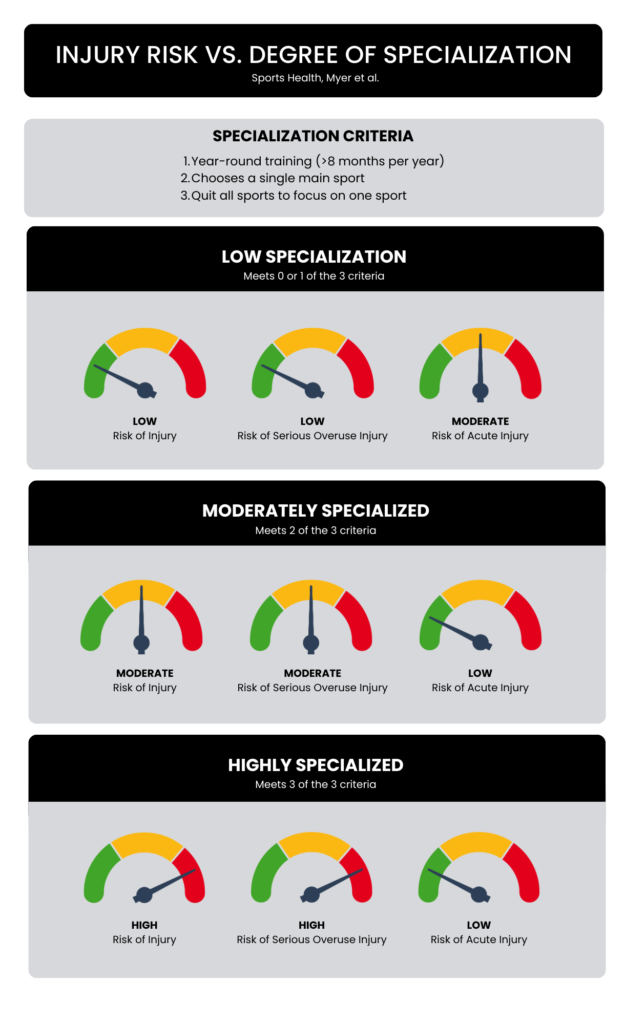Specializing in youth sports, particularly baseball and softball, has become a controversial issue. These days, athletes have access to training facilities and organized leagues throughout the year. While some argue that specialization allows young athletes to sharpen their skills and become experts in their sport, others believe that it can lead to burnout, overuse injuries, and limit opportunities for athletes to develop well-rounded athletic abilities. The question then arises, should young athletes specialize in a single sport to gain a competitive advantage over those who play multiple sports?
ADVANTAGES AND DISADVANTAGES OF SPECIALIZATION IN BASEBALL AND SOFTBALL
In baseball and softball, specialization usually involves playing on club teams year-round and taking part in tournaments. While this can provide valuable exposure to college coaches and scouts, it can also put a tremendous amount of pressure on young athletes to perform at their best. Furthermore, playing the same sport year-round can cause overuse injuries, as athletes don’t get enough time to rest and recover.
On the other hand, some argue that specialization is necessary for athletes to achieve their full potential. In baseball and softball, mastering skills such as hitting and pitching requires a significant amount of practice and repetition. By focusing solely on their sport, young athletes may be able to develop these skills more quickly and effectively.
RESEARCH OF BASEBALL SPECIALIZATION
Recently, Mayo Clinic studied the effect of early specialization on baseball pitchers. This 2023 study by Dr. Chris Camp, Dan Christopher, ATC, and colleagues in the Journal of Shoulder and Elbow Surgery Reviews, Reports, & Techniques, found that single-sport baseball players did not demonstrate better pitching velocity, range of motion, strength, or playing time as compared to athletes who played multiple sports.
In another study that analyzed injury risk versus specialization level by Myer, et al., athletes who specialized in one sport had a low risk of acute (sudden) injury. However, those highly specialized athletes were at high risk of both severe overuse injuries and general injuries. When it comes to baseball, the research suggests that specialization for youth baseball players does not provide an advantage, but rather the disadvantage of a high risk of severe overuse injuries.

A PROFESSIONAL OPINION ON SOFTBALL SPECIALIZATION
Sara Moulton is a former professional pitcher for the Chicago Bandits and the owner of Strike Zone Sports. In a 2018 post by Fastpitch News, Sara writes about the benefits of softball players remaining multi-sport athletes for as long as possible. As a record holder for the University of Minnesota Gophers and one of the best fastpitch softball pitchers in Minnesota, she encourages young athletes to engage in multiple sports to develop athleticism and coordination. Moulton points out that playing multiple sports can reduce the risk of burnout and provide opportunities for learning and mentorship from various coaches.
While the debate on youth sports specialization will certainly continue, current research supports a diverse exposure to athletics rather than specialization in baseball or softball. Playing multiple sports reduces the risk of severe overuse injuries, fosters a well-rounded athlete, and can provide a more enjoyable experience long-term. Ultimately, the decision to specialize in one sport is a personal one that should be made in consultation with coaches, parents, medical professionals, and the athletes themselves. It is important to weigh the potential benefits and drawbacks of specialization and consider the long-term effects on the athlete’s physical health, mental health, and the likelihood of long-term enjoyment of the sport.
If you are a baseball or softball player and would like a free mobility assessment or to easily have an injury assessed, schedule a free 15-minute screening appointment today.





